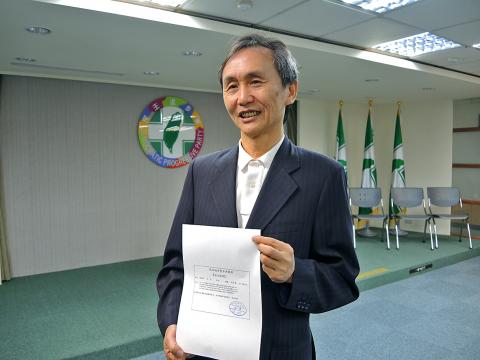A proposal by online news outlet My-Formosa.com vice chairman Wu Tzu-chia (吳子嘉) and former Democratic Progressive Party (DPP) legislator Kuo Cheng-liang (郭正亮) — both DPP members — to revise the party charter’s clauses on Taiwanese independence drew mixed reactions.
“We are not trying to freeze the clauses on Taiwanese independence, we are not even proposing anything concrete,” Wu told reporters at the DPP headquarters in Taipei. “The party charter and many of the party’s major resolutions contradict each other and the charter denies the Republic of China [ROC], which is not in accordance with the political situation.”
“The political situation is that President Tsai Ing-wen (蔡英文) was sworn in as the ROC president under the ROC Constitution — the party should catch up with the president and the government,” Wu said.

Photo: CNA
Article 1 of the DPP charter, passed in 1991, states that it is the party’s objective to establish a sovereign and independent Republic of Taiwan.
In 1999, the DPP adopted the Resolution on Taiwan’s Future, which says that Taiwan is already a sovereign and independent nation, and therefore any change of status must be decided by the people of Taiwan.
In 2007, the DPP passed the Resolution on Normalization of the Nation, which reaffirmed that Taiwan is a sovereign and independent state, but added that due to pressure from China, Taiwan could not sustain a role in the international community as a “normal nation,” and therefore the party would push for the “normalization” of Taiwan’s status in the international community.
Wu and Kuo said that as Tsai’s proposal to maintain the cross-strait “status quo” won overwhelming public support in the presidential and legislative elections in January, it is time for the DPP to catch up with mainstream public opinion and propose something new in the party charter.
The proposal asks the DPP’s Central Executive Committee to amend the party charter, Wu said.
Formally proposed by 32 party delegates and endorsed by 35, the proposal would be discussed in the DPP national congress next month.
Wu said that he is just a member so he and Kuo are only the planners of the proposal.
DPP spokesperson Wang Min-sheng (王閔生) said that every party delegate has the right to make proposals and any proposal may be discussed in the party’s national congress.
“However, the core value of the DPP that the future of Taiwan should be decided by its people will absolutely not change,” Wang said.
Taoyuan Mayor Cheng Wen-tsang (鄭文燦), when asked to comment on the issue in a radio interview, said that while it does not hurt to have such discussions in the party’s national congress meeting, “the existing Resolution of Taiwan’s Future already includes the idea of maintaining the cross-strait ‘status quo.’”
Former DPP legislator Lin Cho-shui (林濁水) criticized the new proposal.
“Recently some people have been criticizing ‘independence’ as an extreme political doctrine, therefore the DPP should adopt a clause to maintain the ‘status quo’ and give up Taiwanese independence,” Lin said. “Why is every American saying that the US is an independent nation? Why are China, Japan, Germany and all nations believe they are independent nations?”
“Perhaps the truth is that every nation in the world follows some extreme political doctrine and Taiwan should be the only ‘non-independent’ nation in the world to be non-extreme,” Lin said.

An essay competition jointly organized by a local writing society and a publisher affiliated with the Chinese Communist Party (CCP) might have contravened the Act Governing Relations Between the People of the Taiwan Area and the Mainland Area (臺灣地區與大陸地區人民關係條例), the Mainland Affairs Council (MAC) said on Thursday. “In this case, the partner organization is clearly an agency under the CCP’s Fujian Provincial Committee,” MAC Deputy Minister and spokesperson Liang Wen-chieh (梁文傑) said at a news briefing in Taipei. “It also involves bringing Taiwanese students to China with all-expenses-paid arrangements to attend award ceremonies and camps,” Liang said. Those two “characteristics” are typically sufficient

A magnitude 5.9 earthquake that struck about 33km off the coast of Hualien City was the "main shock" in a series of quakes in the area, with aftershocks expected over the next three days, the Central Weather Administration (CWA) said yesterday. Prior to the magnitude 5.9 quake shaking most of Taiwan at 6:53pm yesterday, six other earthquakes stronger than a magnitude of 4, starting with a magnitude 5.5 quake at 6:09pm, occurred in the area. CWA Seismological Center Director Wu Chien-fu (吳健富) confirmed that the quakes were all part of the same series and that the magnitude 5.5 temblor was

The brilliant blue waters, thick foliage and bucolic atmosphere on this seemingly idyllic archipelago deep in the Pacific Ocean belie the key role it now plays in a titanic geopolitical struggle. Palau is again on the front line as China, and the US and its allies prepare their forces in an intensifying contest for control over the Asia-Pacific region. The democratic nation of just 17,000 people hosts US-controlled airstrips and soon-to-be-completed radar installations that the US military describes as “critical” to monitoring vast swathes of water and airspace. It is also a key piece of the second island chain, a string of

The Central Weather Administration has issued a heat alert for southeastern Taiwan, warning of temperatures as high as 36°C today, while alerting some coastal areas of strong winds later in the day. Kaohsiung’s Neimen District (內門) and Pingtung County’s Neipu Township (內埔) are under an orange heat alert, which warns of temperatures as high as 36°C for three consecutive days, the CWA said, citing southwest winds. The heat would also extend to Tainan’s Nansi (楠西) and Yujing (玉井) districts, as well as Pingtung’s Gaoshu (高樹), Yanpu (鹽埔) and Majia (瑪家) townships, it said, forecasting highs of up to 36°C in those areas